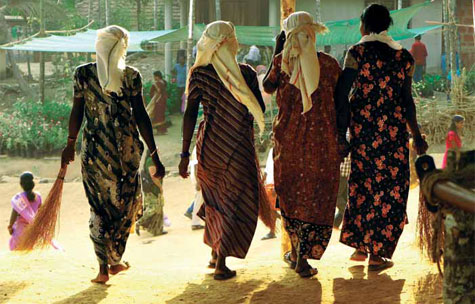

Amidst the brouhaha around the Delhi gang-rape case, concerns are raised whether legislation alone will ensure the safety and rights of domestic workers across the country
By Saher Baloch, New Delhi

Sitting amidst friends and colleagues early on a Sunday morning, Phulkeriya Minz is busy making arrangements for the day. A domestic workersʼ meeting is expected to start any minute now.
Chota Nagpur Working Women Association (CNWWA), located in West Kidwayi Nagar, has been a placement agency for domestic workers in Delhi since 1982. This weekly meeting is a chance for the domestic workers to talk. Mostly, they talk about the problems they face and the treatment meted out to them by their employers.
“Think of it as a way of venting,” explains Minz. Most of these workers hail from Jharkhand. This is the only place where workers are allowed to fearlessly speak their mind.
Their conversations and complaints get documented,
she adds.
With the death of the victim of the Delhi gang rape
incident recently, the debate at the association has shifted
more towards ensuring the physical safety of domestic
workers. Even though a recent inclusion of domestic workers
in a long awaited Sexual Harassment Bill was lauded in August
2012, many workers at CNWWA think it has nothing to do with
them.
“Who cares for us exactly?” asked a middle aged woman, introducing herself as Shanti, (last name not given).
“What can a piece of paper guarantee? I know for a fact that I
have to take care of myself; no law can do that for me.”
Shantiʼs opinion is shared by most of her colleagues, who nod
in agreement. They mention a host of other abuses that are
not reported at all.
Just last week Minz went to Gurgaon to meet an employer of one of the women from CNWWA. The complaint was that the woman was asked to sleep under a staircase with even a blanket or a pillow. In another case, a worker reported that she was beaten by her employer in Ghaziabad after she used the common bathroom in the apartment. “You donʼt need a law to make people behave or to feel for the other (sic),” adds Minz angrily, while the chatter in the room fizzles out.
It is to avoid such incidents that CNWWA pre-arranges the terms and conditions of employment before placing a domestic worker.
Minz negotiates every detail, right
from salary to the domestic workerʼs
meals and sleeping arrangements. This
is done in the presence of both
employer and employee. For instance,
the initial salary is fixed at Rs. 6,000 a
month and above. There is a clause
specifying working hours, which is not
supposed to be more than 8, and an
added section about bedding. In
another clause the employers are asked
to give the employee a two hour
break every day. Most of these
clauses are accepted by the employers,
Minz added.
However fiery and forthright these
women are in their
speech, they do not say
much when it comes to
sharing instances of
sexual harassment at
the workplace. Recently,
a 13-year-old girl was
rescued from an
apartment in Dwarka
after her employers had
locked her in and gone on holiday. This
is just one of the many cases that
expose the vulnerability of the domestic
workers to abuse and exploitation.
When asked whether or not
workers report sexual or physical
abuse, Minz was quick to clarify, “Look,
so far we havenʼt come across such
incidents at all. Thatʼs the only reason
we donʼt place younger women, only
mature ones.”
This decision came after a recent
incident, where one of the young
workers in Kidwayi Nagar quietly left her
employment without citing the exact
reason. One of her friends later reported
that the girl was molested by her
employerʼs husband. Though placement
agencies insist they are in constant
touch with the women they contract out
for employment, it remains unclear
whether they can ensure their safety
from within the confines of an
employerʼs home.
Jaya Iyer, a social activist,
believes that no amount of legislation
can bring security. However a legal
framework is needed and is
important. “Legislation is not enough. Mindsets and cultures have to be
changed and the perception of privacy
or ʻghar ki baatʼ must be breached. Itʼs
high time,” she says.
At the same time, she adds that efficacy of the law is impossible until a domestic worker reports abuse or poor treatment.
Big exodus to urban areas
With an estimated number of half a
million domestic workers, Delhi has
seen many phases of external and
internal exodus. In the 70ʼs, men from
Nepal would come in hordes to the city
looking for menial jobs, mostly as
guards and servants. The 80ʼs saw an
influx from West Bengal, Orissa and
Chattisgarh.
“From the 90ʼs and onwards, there has been an internal migration going on,” adds Iyer. Most workers were flocking in from Central India.
For the past one decade though, with natural disasters like the tsunami in 2004, and an overall unrest in some tribal areas, the city has seen an influx of migrants from Jharkhand and other connected areas.
With no knowledge of language
and the life in cities, many women come
to Delhi either to look for better
employment to support their families or
to support their own education. But
somewhere in the middle they fall into
the trap of people on the look out to earn
a quick buck.
Minzʼs CNWWA is among the 2300 placement agencies in the city out of which only 269 are properly registered. Most of these agencies are on a tricky platform to redress abuses, thus demonstrating a need for a national policy or guideline for the rights of workers.
With the ongoing debate on
domestic workers rights, activists like
Iyer feel that it might take another
decade to properly see the recently
amended Sexual Harassment Bill
through. The bill initially excluded
domestic workers but after protests
from civil rights activists, the
domestic workersʼ rights were included
in mid-2012.
• An earlier version of the draft left out domestic workers provision in 2010.
• In 2012, it was unanimously passed in the parliament.
• Fine of upto `50,000 will be charged in case of noncompliance of the law.
• Unlike legislation in many other countries the bill does not provide protection to men.
Citing an example, she said that,
the Domestic Violence Act was passed
in 2005 after being ʻdiscussedʼ for eight
to 10 years. “The fact of the matter,”
she adds, “is that the administration
hasnʼt got its act together, even as
abuse of workers increases. At the
same time the laws canʼt work without
the social support of people,” citing the
example of the recent Delhi gang rape
incident, in which people from all walks
of life took to the streets in support of
the victim.
In the meantime,
there are a lot of abuses
taking place that go
unnoticed. Out of these
cases only a select few
come out in the open,
depending on the extent
of barbarity.
“It is more about social interven tion at every level. It needs to be about empowering workerʼs groups, validating intervention and for people like us to be more sensitive to such incidents,” Jaya adds.



